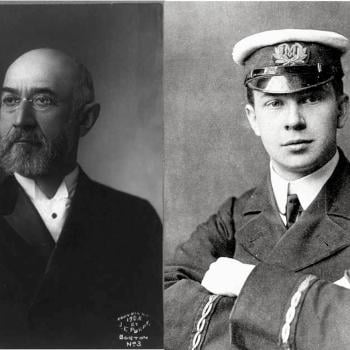This is heresy, a word I don't throw around promiscuously. But in orthodox Christian belief, only God can conquer evil and death, although this is exactly the sort of remark that emerges from a belief that one is chosen by God. Since this speech, our responsibility to "history" has inspired many, although the realities of intransigent local populations, tenacious terrorists, and the not-limitless capabilities of our brave but over-committed armed forces (to say nothing of simple human waywardness) put the lie to America's ability to ever rid the world of evil.
Reality, however, doesn't seem to bother those who truly believe in our exceptionalism. American civil religion is a Constantinian faith -- which is to say that it represents a wedding of theology and personal and political self-interest. Who doesn't like thinking of themselves as exceptional? Or wish to be considered exceptional by others? When we are chosen, our actions are blessed by God, rather than our having to seek out God's will and then acting in accordance with it.
But, as we asked, where might we find a basis in Christian theology (and not in American hopes, dreams, and assertions) for the notion that America is divinely blessed?
Save for those folks who believe that they spot prophetic references to America in apocalyptic texts, there seems to be no scriptural basis to imagine God loves America; there was, of course, no America when the books of the Bible were written. But the Founding Fathers are often claimed as the source of our concept of American exceptionalism, an appeal to a civil religion tradition if not a Christian theological tradition. As an opinion piece in the Washington Times explains, "American exceptionalism is grounded in the founding of the United States upon an idea, rather than upon the ambitions of men." For those who believe in American exceptionalism, the idea has a sacred quality.
During the ads bracketing my radio appearance the other night, on a number of blogs, in political rallies, and on Glenn Beck's show, quotes from John Adams, Patrick Henry, George Washington, or Thomas Jefferson are cited to prove that America was founded on Christian principles. Even if this is true (Adams, for example, is supposed to have said that "the general principles of independence are the general principles of Christianity," but as with almost all the quotes circulating now, it is taken badly out of context), would America's desire to follow Christian principles necessarily make us a nation blessed by God?
I love the Founding Daddies, as Molly Ivins used to call them, and like her, I think of them as the smartest sumbitches ever, but I do not think of them as creating a Christian nation in the way we now seem to envision it. Despite the protests of all those quoting the Founding Daddies, many of them actually were Deists, which is to say they believed in a God who set the world in motion and exited the scene. Thomas Jefferson, perhaps my favorite Founding Daddy, excised all of the miracles of Jesus from his New Testament because he found them frankly unbelievable and sought a "pure deism," a victory for rationality if perhaps a setback for true faith.
But let's stop fact-checking and grant the assertion that the Founding Generation chose to bring forth a new country founded on the laws of God. Even if they established America as a Christian nation, would that make us blessed?
Unlike Israel, which theologically understands its own exceptionalism to result from God's covenant with Abraham and from the promise of the land of Canaan to the Hebrews in exile (as well as from, a matter for more theological conjecture, the near-annihilation of European Jewry in the Holocaust), American exceptionalism does not seem to have an obvious warrant within the Christian tradition. At its core, it seems to be a covenantal theology: we chose God, so God chose us, as God obviously has, or we wouldn't be so great.
But the problem is that Christian theology doesn't seem to ratify this national covenant between God and the U.S. Repeating individual covenant affirmations from the Hebrew Bible or retrofitting covenant assertions to the nation of Israel as though they fit America do not convince me. I do not believe these promises are transferable, particularly since I understand that Jesus came to extend God's gift of relationality to all humankind.
And, for that matter, I don't believe in a covenantal Christianity. We do not induce God, the Supreme Power of the Universe, to behave in a certain way toward us by our prayers, promises, or actions. To believe that we do is not faith; it is magic. God does what God wills, and we say, "I will love Thee, O Lord, my strength," regardless of reward, because that is what the created do.
America has indeed been blessed -- with natural resources, with beautiful countryside, with brilliant thinkers and devoted public servants and skilled artists, with people of faith and people of no faith.
But ultimately, the question is, Has God blessed us in these ways because we are chosen in God's eyes?
Has God blessed us because we have chosen to strive to be faithful to God's desires for humankind?
Or has God blessed us because God is a God of blessing, and thus beauty, truth, and wisdom all flow from God unceasingly?
I think I've reached my decision for the time being. What do you think?





